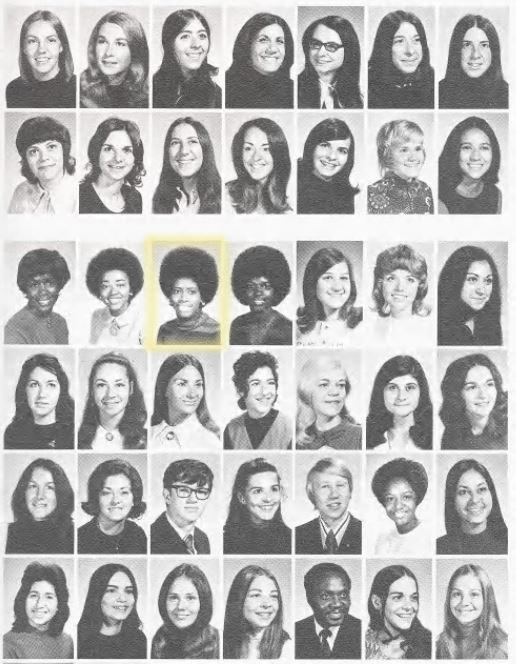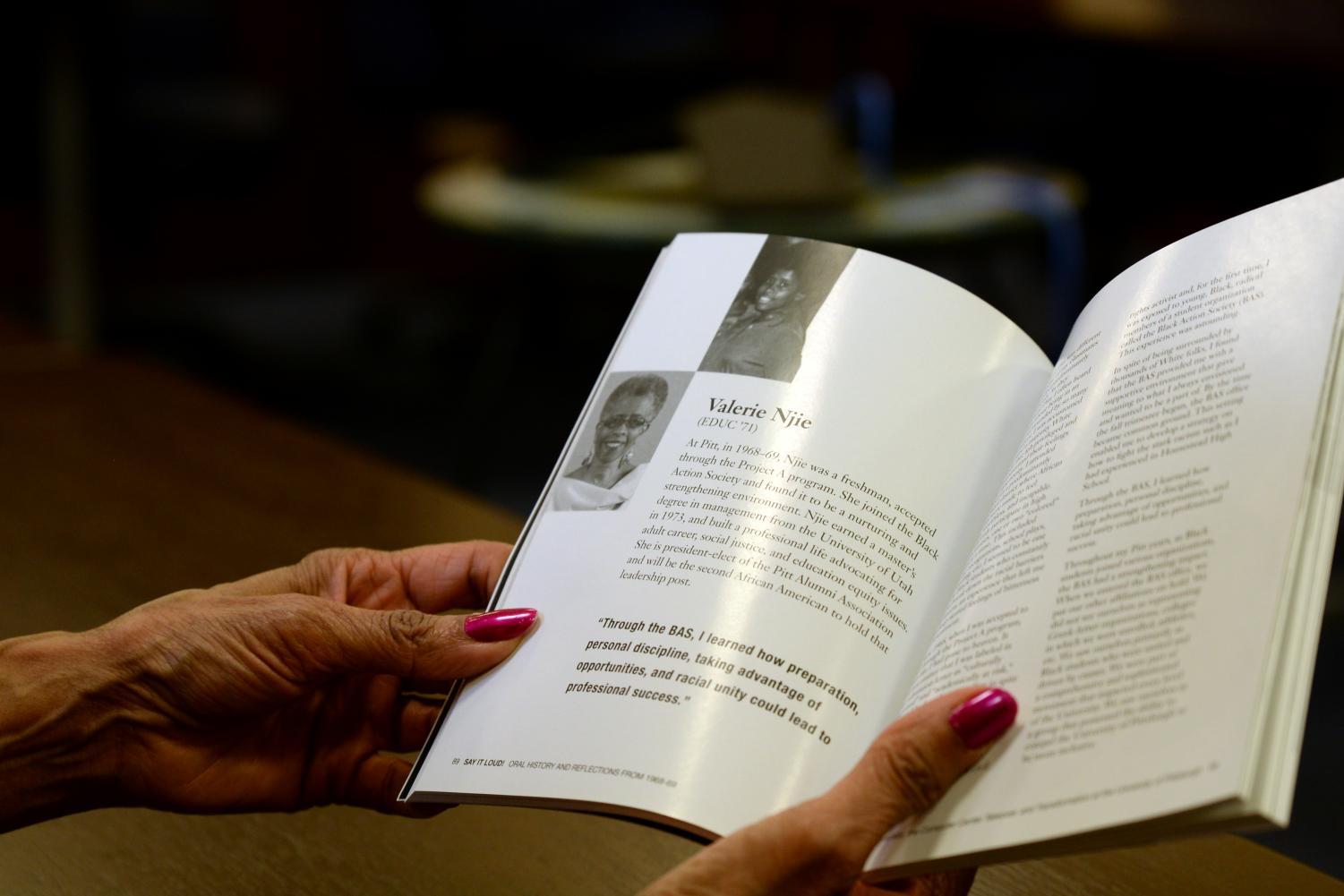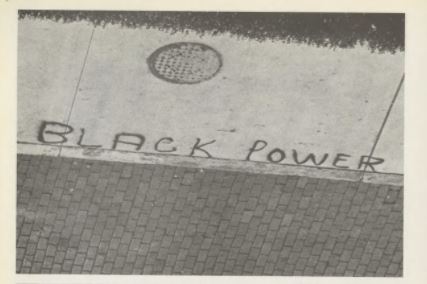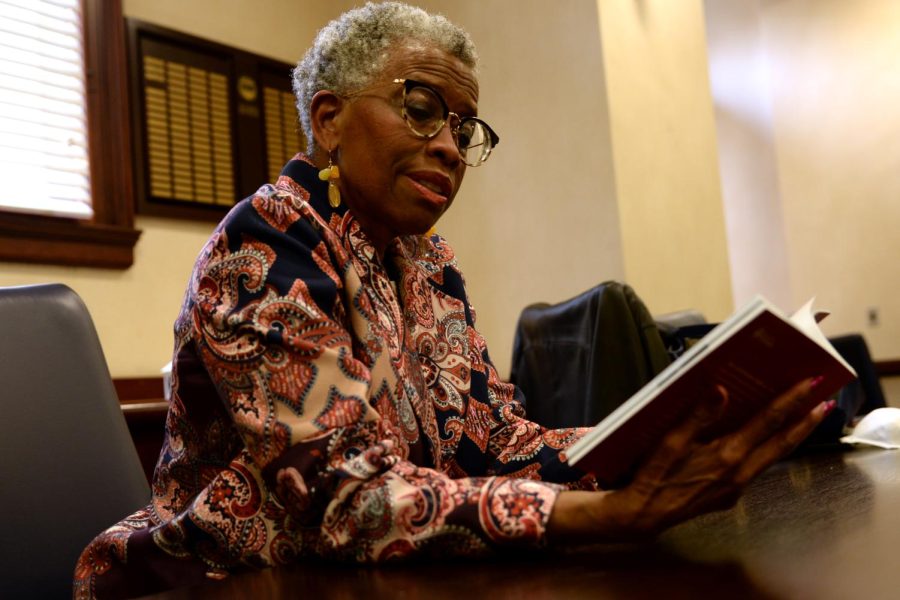‘Giant of a leader’: Val Njie encourages Pitt students to grow, take risks
Clare Sheedy | Assistant Visual Editor
Valerie Njie looks at pictures in “Say It Loud! Oral History and Reflections from 1968-69.”
February 16, 2022
Val Njie’s mother handed her the phone in June 1968 — someone from the University of Pittsburgh wanted to schedule an admittance interview with her. She was accepted into the University a week later and told to report to campus at the end of the month.
“I just wanted to go to college, I didn’t know what happened there. I didn’t know anything about sororities,” Njie said. “I didn’t know how many Black people were there — I mean, I was just thrust into heaven.”
Njie was accepted to Pitt as part of Project A, a University program which aimed to increase enrollment of students of color. Now, 54 years after Hayden’s phone call, she serves as president of the Pitt Alumni Association. Njie learned from her parents and peers to “do whatever you can to help others — that’s the expectation — do for others, and so that’s what I do [as Alumni Association President] — I feel that’s my responsibility.”
Ludwick “Luddy” Hayden, former director of Project A, said the program worked to admit more students of color into Pitt on full-tuition scholarships. It also protected them from academic expulsion and provided academic counseling services. Hayden said Project A lasted only one year before becoming the University Community Education Program in 1969, and what he described as a “much broader minority student group mission and support project.”
“I never dreamt that anything like that could exist. I never dreamt that there were actually people at all levels who would be there for me, like the community I came from,” Njie, a native of nearby Homestead, said. “‘We’re going to do everything we can to make sure you are a success.’ No, I never knew anything like that could exist.”

Njie said she has worn “many hats” throughout her career — including education specialist with the State Department, educational social worker with the Peace Corps in The Gambia, the first Black person elected as commissioner for the Accrediting Commission of Career Schools and Colleges as well as “PTO extraordinaire” when her daughters Lingaire and Njaimeh were in elementary school.
Njie said while growing up going to a “majority white school,” she faced many difficulties getting into college and used her mother’s help to call admission offices. She said her high school counselors either “didn’t really care” or “the times did not require them” to help Black students.
“They would help you get a job but they didn’t help you go to college,” Njie said. “They used to help usually one [Black] person a year — you know what, really, seriously they used to help one.”
Njie said despite the barriers she faced at Homestead High, she found ways to be active through participating in majorettes, the honors society, jazz band, concert band and the library club.
She graduated from Pitt’s School of Education in December 1971 — a semester early. Njie said she was a member of Delta Sigma Theta and the Black Action Society during her time at the University. She also participated in the famous 1969 BAS takeover of the Cathedral of Learning’s computer center.
She said it was that first summer at Pitt, in 1968, where she met “giants” she looked up to — including some of her sorority sisters, BAS members and Pitt instructors.
One of those giants was Hayden, the director of Project A who interviewed Njie in 1968 for admission. Njie said Hayden “made it all happen” for her.
“You know, it might not be realistic to say ‘he accepted me,’ but I really in my spirit feel like that interview made it all happen for me,” Njie said. “It could have been someone else. It was something about the way he cared, and how he continued to push.”
Hayden said as a student, Njie was “energetic, focused, gregarious and just committed to being successful.” While Njie credits Hayden as the person who got her into Pitt, Hayden said he feels he cannot alone take credit for the acceptance.
“It was like a perfect storm. I was there, the program was there and Valerie wanted to be successful,” Hayden said. “When those things came together, the result is that we have — Valerie Njie, a giant of a leader.”

Hayden said Njie’s success “was not hers alone” and part of something bigger.
“Valerie is one of those students who always felt her own success was not hers alone, but that she represented a whole collection of people like herself – other African Americans, particularly other African Americans from her hometown of Homestead,” Hayden said.
When Njie first started at Pitt, BAS was less than a year old. Njie, who joined the group during her first year, remembers the BAS office as her “home base.” While she was often the only Black student in her classes, having other students in BAS and Delta Sigma Theta to connect with energized her to speak out about racial injustice.
“The BAS was it, that’s what was going to sustain you, that’s where you got your fuel,” Njie said. “That was home base for everybody. Had it not been for that, I know I would not have been able to do what I went on to do.”
Tony Fountain, who graduated with a communications degree from Pitt in 1970 and was chair of the BAS Political Action Committee, knew Njie when they were both students. The pair have gone from being mostly acquaintances — he saw her as “quiet and reserved” — to close friends.
“Val is just a ball of energy and I am so fortunate [to be her friend],” Fountain said.
Njie said another “giant” she looked up to while at Pitt was Jack Daniel, who at the time was an assistant professor and involved with Project A.
Daniel, a former dean of students and distinguished service professor, said he admires Njie’s commitment to social justice.
Njie said she wouldn’t have been able to succeed without mentors. One of the first was her grandmother Grace Griffin.
“She knew how to care for people. She was so compassionate, so very intelligent and just had this endless energy,” Njie said. “She was my first teacher — and even when I got out of the School of Education here, when I went to teach children, I used some of her methods.”

Njie said she now makes it a point to pay it forward, and mentor students in which she sees promise.
One of those mentees is Oluwatobi “Tobi” Ajimoko, a 2019 alumna who majored in economics and Africana studies. Njie helped mentor her through her MHA application to Georgetown University and law school applications.
As she grew during her undergraduate years, Ajimoko said she “wanted to become more like the mentors [she] had.”
“I like how flexible Ms. Val has been, because she took on the role of like answering questions, but she also is somebody who can sit back and let you decide what you want — and she’ll be there if it works out and she’ll be there if it doesn’t,” Ajimoko said.
Coming from a minority family where they “know how much privilege you have going to college,” Ajimoko said she felt the pressure to “take the safe route” for a career, such as becoming an accountant or doctor. She said Njie was a mentor who encouraged her to take risks, which was “refreshing,” but she also “knew when to call you out.”
“I remember when I told [Njie] I was moving to Colorado and she was like, ‘Great. Don’t stay here, because then you’ll just be in the same place you’ve always been,’” Ajimoko said. “[Njie] has been able to make her decision every step of the way. And I think that’s a quality of a great mentor – because they know what it means to take a step in the dark.”

Nancy Merritt, Pitt’s vice chancellor for alumni relations, said Njie is “inspiring” and “incredibly generous with her time.” Merritt said she frequently sees Njie make time for mentoring and advising students, alumni, faculty and staff.
After living all over the world — including Boston, Chicago, The Gambia and Salt Lake City — Njie now calls Pittsburgh her home.
No matter what committee she’s leading, Njie said she always comes “ready — I mean it is detailed.” She said “that’s just the way it is” because she realizes her comments matter and her votes “mean something to a lot of people.”
Njie said with the support of her mentors, she felt confident in her mission to succeed.
“I was on a mission. These individuals inspired me so much, I mean they led me to believe I could do anything. And so when I was 20 years old I finished, left here with a plane ticket to Chicago and $90 — and no fear. I just knew I was going to be able to make it, and I did.”








